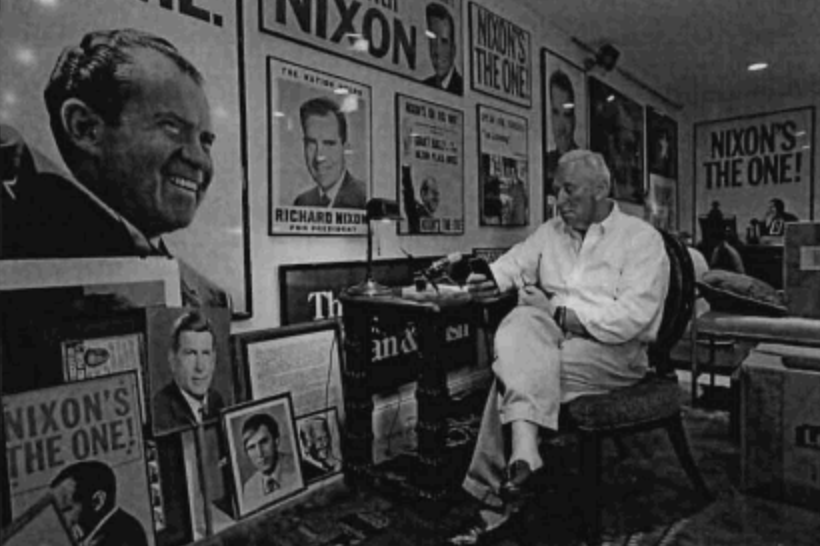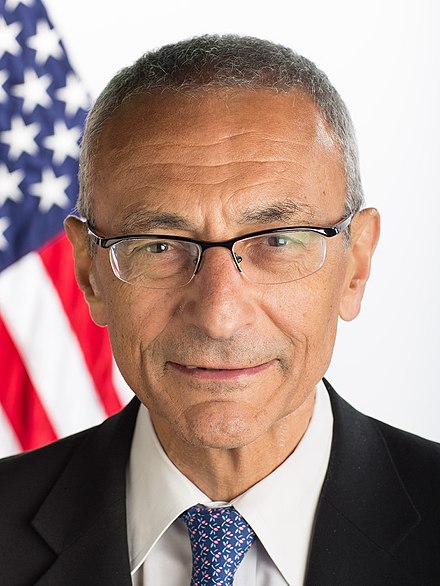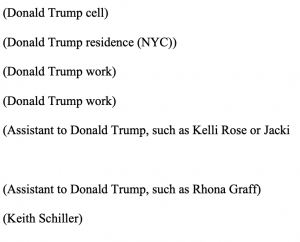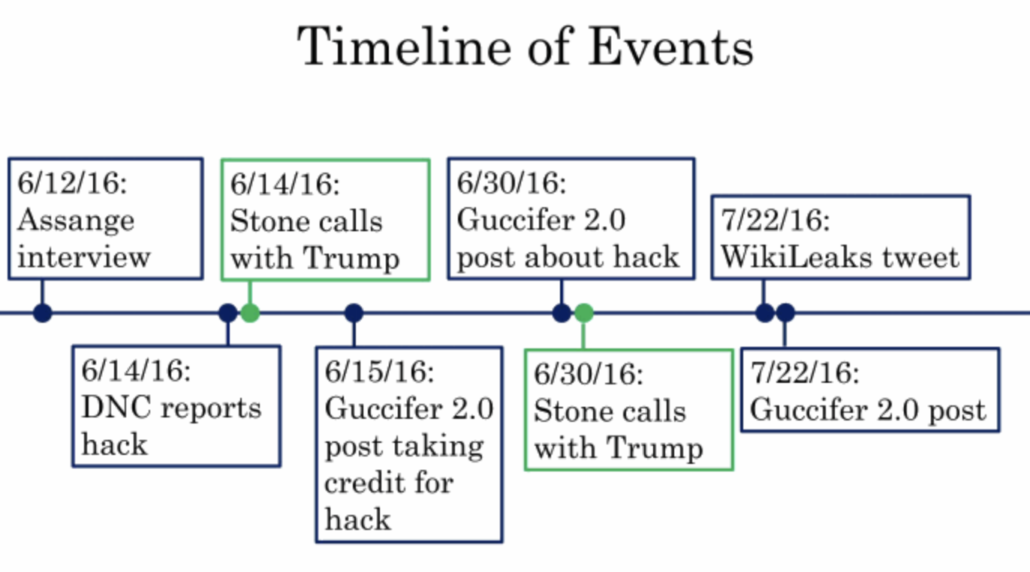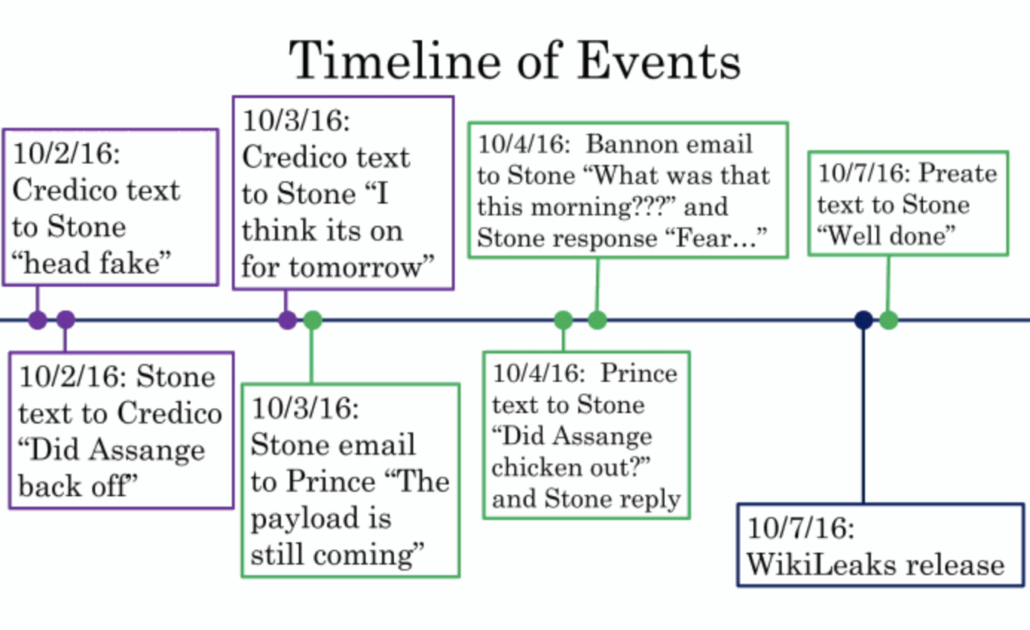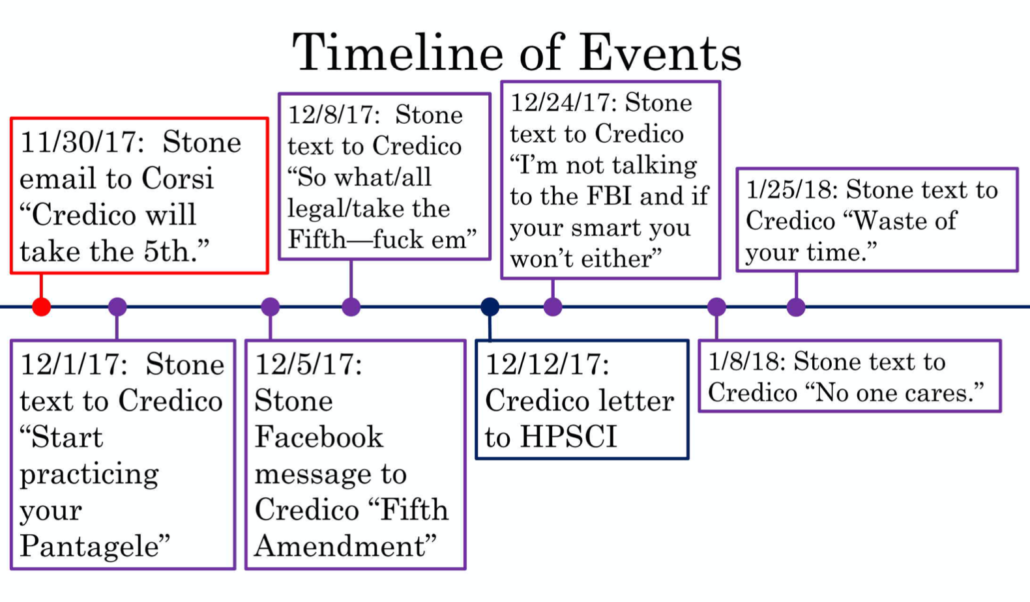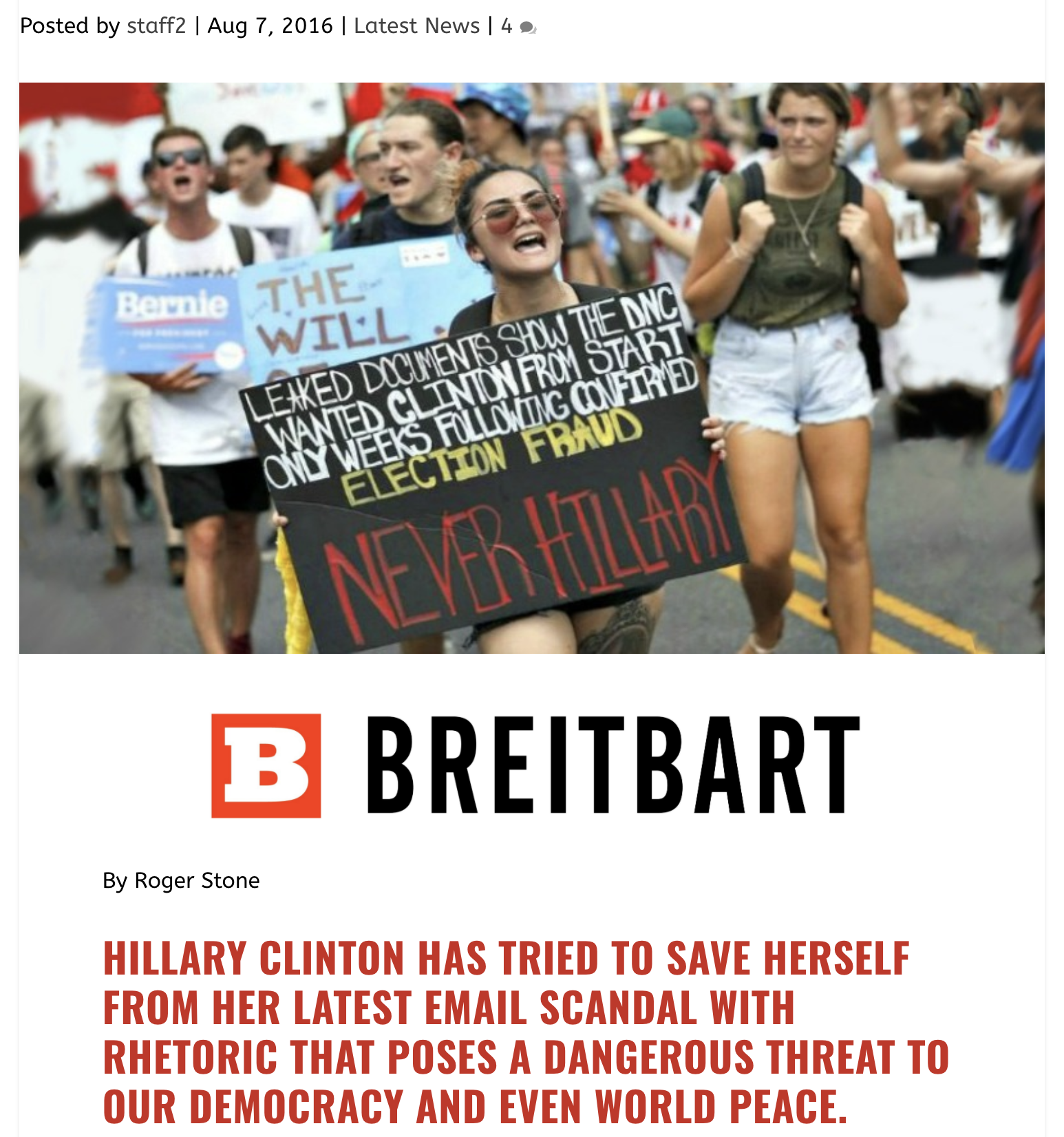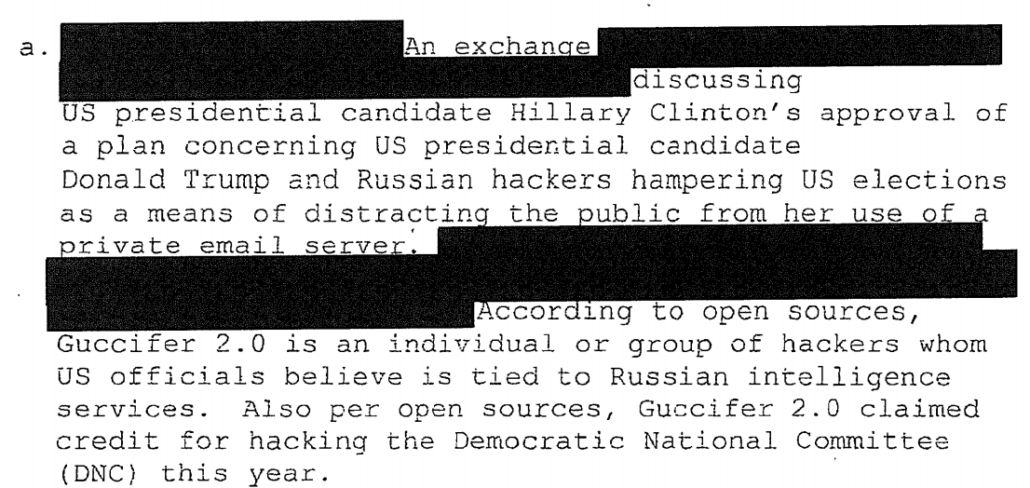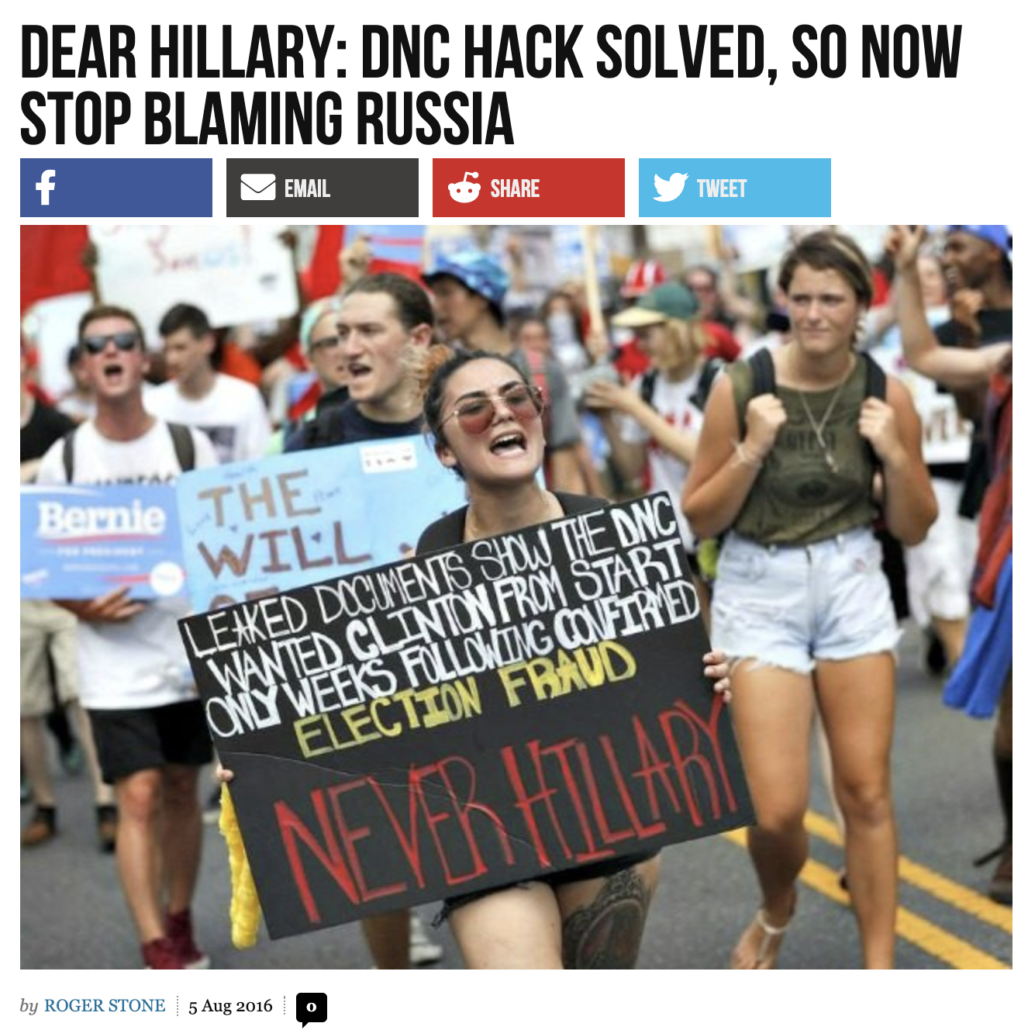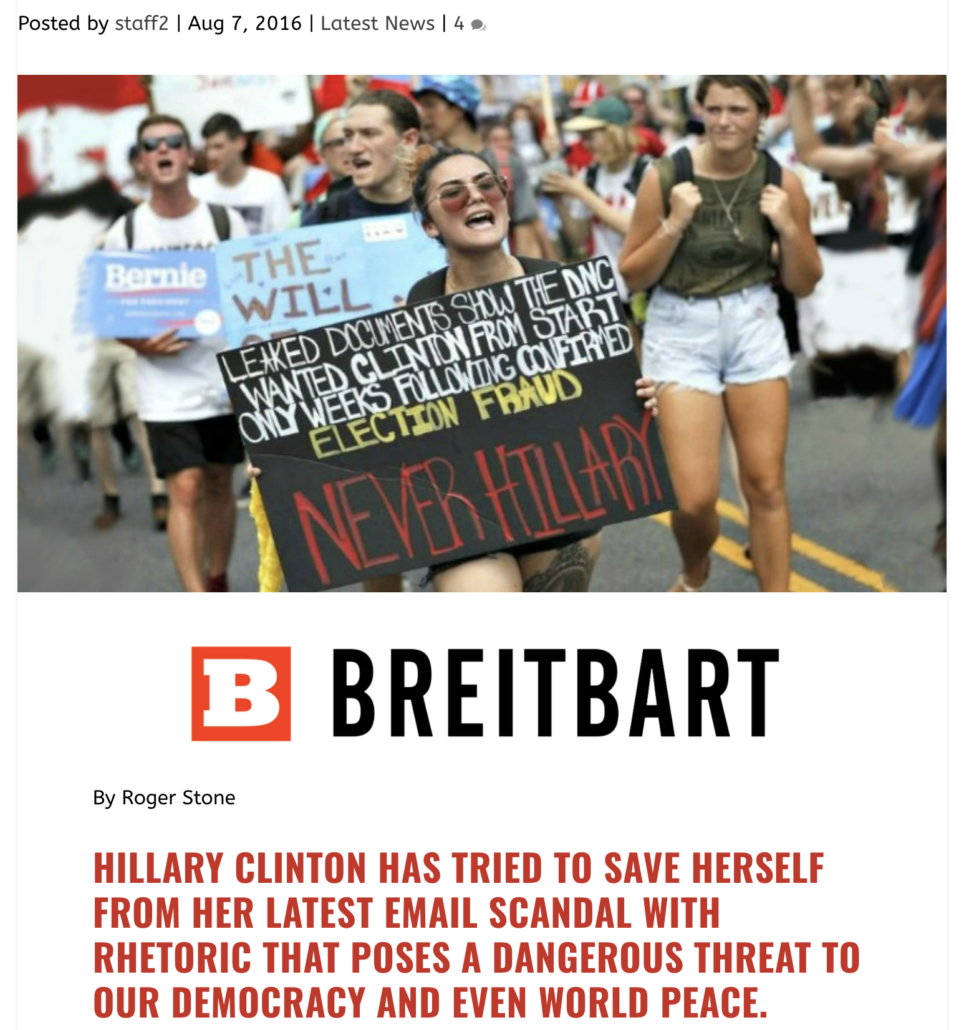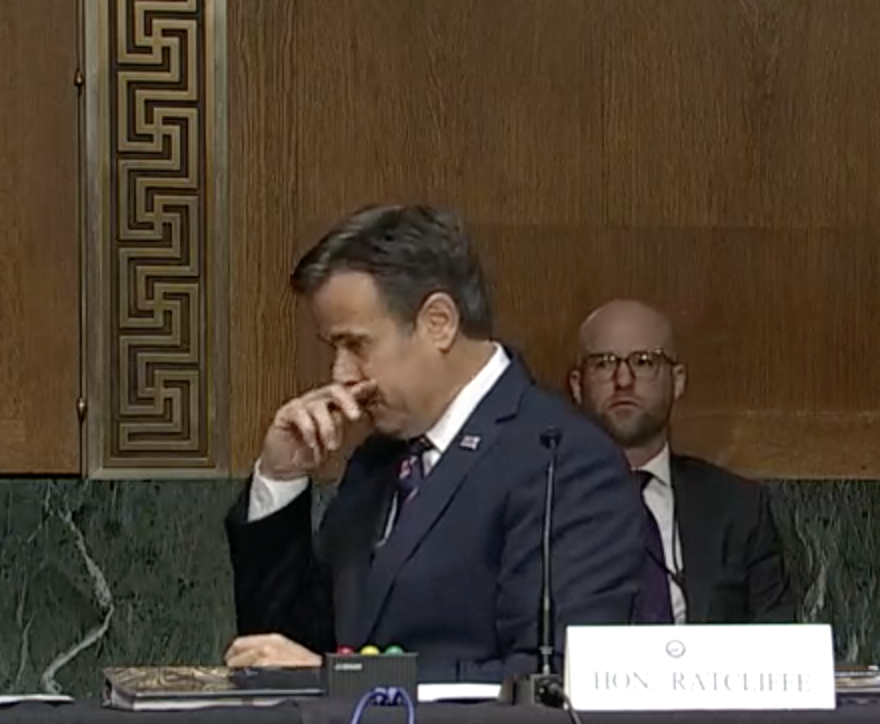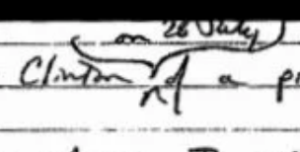In the previous installment of this series, I showed that rather than describing the conclusions of the Mueller team’s investigation into whether, how, and why Roger Stone optimized the release of the John Podesta emails on October 7, 2016, the Mueller Report instead plopped a comedy routine showing how Jerome Corsi changed his story from minute to minute on the topic.
The choice is all the more interesting given that the affidavits used in the Stone investigation — to say nothing of witness testimony — makes it increasingly certain that Stone got advance notice, and probably advance copies, of the stolen emails that pertained to an attack regarding Podesta’s ties to a company with Russian ties, Joule Holdings, that the frothy right had been chasing for months before mid-August 2016.
Jerome Corsi’s Podesta email was actually about timing
The email that Jerome Corsi sent Roger Stone on August 2, 2016 has been widely misunderstood, including by the SSCI Report.
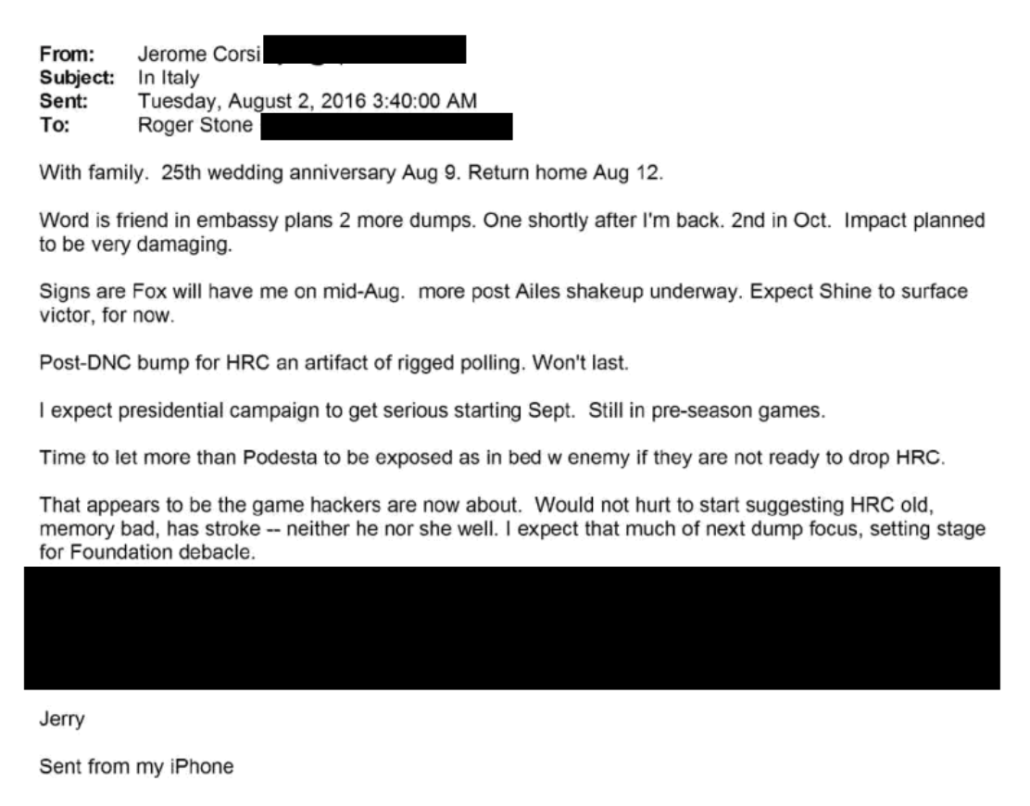
“Word is friend in embassy plans 2 more dumps,” Corsi explained after informing Stone he hadn’t called him back, as Stone requested the day before, because he was in Italy. “One shortly after I’m back. 2nd in Oct.” This language about timing is what Aaron Zelinsky focused on when introducing the email at Stone’s trial. It’s the language that Jonathan Kravis highlighted in his closing argument. In neither prosecutors’ description of the email do they mention John Podesta (though later in Zelinsky’s opening, he describes that, “Roger Stone promised … a massive amount of hacked emails belonging to Clinton campaign chairman John Podesta” would be dropped on October 7).
Nevertheless this email has been taken as the means by which Corsi informed Stone that the upcoming WikiLeaks dump involved files stolen from John Podesta.
It’s only much later in the email when Corsi says, “Time to let more than Podesta to be exposed as in bed w enemy.” The reference to Podesta would be incomprehensible to Stone if it were his first notice that WikiLeaks was going to drop emails stolen from Hillary’s campaign manager. Moreover, Corsi wouldn’t bury it in the sixth paragraph if it were new news, particularly not given that the right wing oppo researchers Steve Bannon paid, the Government Accountability Institute, had just days earlier released a report that focused on John Podesta. Indeed, it’s even possible that the email doesn’t reflect advance knowledge of the Podesta emails, but was instead a reference to that report.
There’s no reason to believe that the Podesta reference in this email was news to Stone.
Corsi put the new news — that the dumps were coming shortly after he was scheduled to return from Italy on August 12, and then again in October — in the second paragraph. And as some of the affidavits described obliquely — but which did not get mentioned in any of the other three Roger Stone stories — the timing of both those predictions was absolutely correct.
Based on my training, experience, and review of materials in this case, it appears that CORSI’s reference to a “friend in embassy [who] plans 2 more dumps” refers to Julian ASSANGE; the founder of Wikileaks, who resided in Ecuador’s London Embassy in2016. As discussed above, Guccifer released information hacked from the DCCC on August 12,2016 (the date CORSI identified as when he would “return home.”)
FBI Agent Amy Anderson mentions, but does not explain, that Corsi did not correctly predict who would release these files.
Two releases, one from Guccifer and the other from Wikileaks, occurred at the times predicted by CORSI.
In fact, as Raffi Khatchadourian was the first to explain publicly (but as would have been clear to investigators once they obtained the relevant Twitter content), Guccifer 2.0 and WikiLeaks engaged in a series of very theatrical DM conversations with Emma Best over that weekend in August 2016 about whether Best would publish the DCCC emails; even after WikiLeaks convinced Best to hold off so it could have exclusivity, WikiLeaks never did publish any DCCC documents. At the time Corsi learned that “friend in embassy” would have two upcoming drops, WikiLeaks was still demanding exclusivity before it would deliver the first one.
In the August 2 email, then, Corsi provided new news to Stone about what the Russians were planning, but (if the theatrical DMs are to be believed, which they shouldn’t necessarily be) Assange had yet to buy into the plan. That makes Corsi’s description of “the game hackers are now about” all the more intriguing.
There’s no reason to believe, from this email, that Corsi was newly informing Stone that WikiLeaks would eventually dump the Podesta emails. There’s not even any reason to be sure that Corsi informed Stone of that fact and not vice versa. Indeed, the Mueller Report describes that Corsi told Ted Malloch later in August that, “Stone had made a connection to Assange and that the hacked emails of John Podesta would be released prior to Election Day,” not that he himself had. The email is indication (though in no way, by itself, proof, especially given the possibility it referenced the GAI report) that both believed by August 2 that WikiLeaks would drop the Podesta emails. It is not proof that Corsi told Stone of that fact.
Rick Gates and Paul Manafort testified that Stone knew Podesta emails were coming
We can get a lot closer to proof that Stone had advance knowledge of the Podesta drop, though.
First of all, it’s not just Malloch who testified to having conversations about Podesta’s emails in August. According to the SSCI Report, in part of Rick Gates’ October 25, 2018 interview that remains redacted,
Gates recalled Stone advising him, prior to the release of an August 14 article in The New York Times about Paul Manafort’s “secret ledger,” that damaging information was going to be released about Podesta. 1579 Gates understood that Stone was referring to nonpublic information. Gates further recalled later conversations with Stone about how to save Manafort’s role on the Campaign, and that Stone was focused on getting information about John Podesta, but said that Stone did not reveal the “inner workings” of that plan to Gates. 1580
An unredacted part of that 302 — which is likely the continuation of the discussion cited in SSCI — explains,
Gates said there was a strategy to defend Manafort by attacking Podesta. The idea was that Podesta had baggage as well. Gates said it was unfortunate the information did not come out in time to defend Manafort from his ultimate departure from the campaign.
In a September 27, 2018 interview, Manafort provided details of two conversations that he placed in August 2016, one of which provided specific details (which remain redacted, purportedly to protect Podesta’s privacy!) about John Podesta’s alleged ties with Russia.
Manafort was sure he had at least two conversations with Stone prior to the October 7, 2016 leak of John Podesta’s emails.
In the one conversation between Stone and Manafort, Stone told Manafort “you got fucked.” Stone’s comment related to the fact that Manafort had been fired. The conversation was either the day Manafort left the campaign or the day after.
In the other conversation, Stone told Manafort that there would be a WikiLeaks drop of emails with Podesta, and that Podesta would be “in the barrel” and Manafort would be vindicated. Manafort had a clear memory of the moment because of the language Stone used. Stone also said Manafort would be pleased with what came out. It was Manafort’s understanding that WikiLeaks had Podesta’s emails and they were going to show that [redacted] Manafort would be vindicated because he had to leave the campaign for being too pro-Russian, and this would show that Podesta also had links to Russia and would have to leave.
Manafort’s best recollection was the “barrel” conversation was before he got on the boat the week of August 28, 2016.
Roger Stone’s longtime friend Paul Manafort, at a time when he lying to protect key details about what happened in 2016, nevertheless confirmed that Stone had detailed knowledge not just that the Podesta files would drop, but what Russian-based attacks they would make of them.
The government almost certainly has proof Stone and Corsi had advance copies of the Podesta files
More importantly, there’s evidence that Corsi had copies of some of the Podesta emails by August 14, and had pre-written attacks on Podesta already drafted when the files came out in October.
On March 23, 2017, Corsi published what he claimed was an explanation for Stone’s August 21, 2016 “time in the barrel” tweet. In it, he explained that in response to the August 14, 2016 NYT story exposing Paul Manafort’s Ukraine corruption, Corsi started a memo for Stone on Podesta.
On Aug. 14, 2016, I began researching for Roger Stone a memo that I entitled “Podesta.”
On August 15 at 1:33 AM, Stone tweeted about Podesta for the first time ever,
@JohnPodesta makes @PaulManafort look like St. Thomas Aquinas Where is the @NewYorkTimes ?
At 8:16AM on August 15, Corsi texted and then at 8:17 AM Corsi emailed Stone the same message:
Give me a call today if you can. Despite MSM drumroll that HRC is already elected, it’s not over yet. More to come than anyone realizes.
According to the SSCI Report, at 12:14PM on August 15, Corsi and Stone spoke by phone for 24 minutes.
The implication in Corsi’s March 2017 post was that he spent the next two weeks writing the memo that he started on August 14 and that the report reflects “several detailed conversations” Corsi had with Stone.
I completed that memo on Aug. 31, 2016, and is embedded here in its entirety.
Between Aug. 14 and Aug. 31, 2016, Roger Stone and I had several detailed conversations about the Podesta research.
Except that prosecutors obtained several kinds of proof that Corsi only started writing the memo he published in that March 2017 column (which Stone submitted to HPSCI — starting at PDF 39 — as part of his prepared statement) on that same day, on August 31. Corsi started writing it after Stone called him on August 30 and asked him to do so. This would have started to become clear to prosecutors when they first obtained email returns, since Corsi sent a copy of the report to Stone via email. But according to Corsi, prosecutors found forensic evidence to confirm that.
In his book, Corsi even admitted that the document was a cover story that he didn’t start until August 30 (Stone sued Corsi about this claim).
Next, Zelinsky focused on the email Roger Stone sent me on August 30, 2016, asking me to call him. As we discussed earlier, that led me to write a “cover-up memo” for him on John Podesta, suggesting that Roger’s infamous Twitter post about “Podesta’s time in the barrel” was a reference to my research about John and Tony Podesta’s money dealings with Russia. Roger wanted to disguise his tweet, suggesting “Podesta’s time in the barrel” was not a reference to any advanced knowledge Stone may have had from me, when I began telling Stone from Italy in emails dated earlier in August 2016 that I believed Assange had Podesta emails. “We’ve examined your computer Doctor Corsi,” Zelinsky grilled me. “And we know that the next day, August 31, 2016, your birthday, you began at 7:30 a.m. to write that memo for Stone.”
Before returning to Washington to appear before the grand jury, I had taken the time to research the file of my 2016 writing drafts that I had restored to my laptop from the Time Machine. I found that the file that I labeled, “ROGER STONE background PODESTA version 1.0 Aug. 31, 2016” was time-stamped for 12:17 p.m. that day. But I decided not to quibble with Zelinsky, so I agreed. “Then, Doctor Corsi, we find from your computer that the first thing you did was to find a series of open source articles on Podesta and Russia that you could use in writing your memo for Roger Stone,” Zelinsky said, pressing forward. “Is that correct?”
That said, Corsi may well have another report he started on August 14. In his March 2017 piece, Corsi claims that he wrote a series of articles based on that original report, one installment of which Stone would publish under his own name on October 13.
On October 6, 2016, I published in WND.com the first of a series of articles detailing Putin’s financial ties to Clinton and Podesta, based largely on the research contained in the Government Accountability Institute’s report, “From Russia With Money.”
On Oct. 13, 2016, Stone published on his website an article entitled, “Russian Mafia money laundering, the Clinton Foundation and John Podesta.”
A comparison of the two articles will show the extent to which Stone incorporated my research into his analysis.
To the extent that Corsi wrote a series of articles, it would include the following:
- September 28, 2016, “Media neglect Clinton-linked firm’s role in Russia scandal,” conflating John and Tony Podesta, and making much of the latter’s sleazy influence peddling, including the lobbying he didn’t disclose because Paul Manafort told him not to.
- October 6, 2016, “Russia? Look who’s really in bed with Moscow,” citing Podesta’s ties with Joule Holdings and relying on the GAI Report released on August 1; this column got forwarded to some people on the campaign, including Rick Gates
- October 13, 2016, Stone’s “Russian Mafia money laundering, the Clinton Foundation and John Podesta,” which incorporates, but does not link, any WikiLeaks emails
- October 13, 2016, “Hillary campaign chief linked to money-laundering in Russia,” which links to these three emails:
In a November 1, 2018 interview, Corsi explained that he had published the October 6 one (as noted, it was based off the earlier GAI/Breitbart attack), in an effort to force Assange to release the Podesta emails.
Corsi published the August 31, 2016 memo on October 6, 2016. At that time, he still held himself out as the connection to WikiLeaks. The trigger for the release of the article was the publication of an article about [Paul] Manafort and [Viktor] Yanukovych. Corsi wanted to counter it with a story about Podesta, but he really wanted to provide stimulus to Assange to release whatever he had on Podesta. Corsi was angry with Assange for not releasing emails on October 4, 2016.
The claim would only make sense (to the extent that Jerome Corsi can ever be said to “make sense”) if Corsi could threaten to pre-empt what WikiLeaks was about to publish: the Podesta file pertaining to Joule Holdings.
As for the October 13 piece Stone adopted as his own, the affidavits targeting Corsi and Stone provided extensive details on how that got published.
First thing in the morning on October 12, Stone wrote Corsi and asked for his “best podesta links.” (The SSCI Report reveals that Stone and Manafort spoke that day, but does not say what time.) Corsi responded that he would send them on Monday — which would have been on October 17. “The remaining stuff on Podesta,” Corsi said, “is complicated.” That seems to comport with Corsi’s later representation he did a series, of which the October 13 one was part. But it also seems to suggest that the remaining stuff was already written at 8:54 AM on October 12.
75. On or about October 8, 2016, STONE messaged CORSI at Target Account 2, “Lunch postponed- have to go see T.” CORSI responded to STONE, “Ok. I understand.” Approximately twenty minutes later, CORSI texted, “Clintons know they will lose a week of Paula Jones media with T attacking Foundation, using Wikileaks Goldman Sachs speech comments, attacking bad job numbers.”
76. On or about Wednesday, October 12, 2016, at approximately 8:17 EDT, STONE emailed CORSI at Target Account 1, asking him to “send me your best podesta links.” STONE emailed CORSI at approximately 8:$$ [sic] EDT, “need your BEST podesta pieces.” CORSI wrote back at approximately 8:54AM EDT, “Ok. Monday. The remaining stuff on Podesta is complicated. Two articles in length. I can give you in raw form the stuff I got in Russian translated but to write it up so it’s easy to understand will take weekend. Your choice?”
77. On or about that same day October 12, 2016, Podesta accused STONE of having advance knowledge of the publication of his emails. At approximately 3:25PM EDT, CORSI, using Target Account 1, emailed STONE with a subject line “Podesta talking points.” Attached to the email was a file labeled, “ROGER STONE podesta talking points Oct 12 2016.docx.” The “talking points” included the statement that “Podesta is at the heart of a Russian-govermnent money laundering operation that benefits financially Podesta personally and the Clintons through the Clinton Foundation.”
78. CORSI followed up several minutes later with another email titled, “Podesta talking points,” with the text “sent a second time just to be sure you got it.” STONE emailed CORSI back via the Hotmail Account, “Got them and used them.”
79. On or about Thursday, October 13, 2016, CORSI, using Target Account 3, emailed STONE: “PODESTA — Joule & ties to RUSSIA MONEY LAUNDERING to CLINTON FOUNDATION.” STONE responded, “Nice but I was hoping for a piece I could post under my by-line since I am the one under attack by Podesta and now Mook.” CORSI wrote back to STONE, “I’ll give you one more -NOBODY YET HAS THIS[:] It looks to me like [redacted–Vekselberg] skimmed maybe billions off Skolkovo – Skolkovo kept their money with Metcombank[.] The Russians launched a criminal investigation[.] [web link] Once [redacted–Vekselberg] had the channel open from Metcombank to Deutsche Bank America to Ban[k] of America’s Clinton Fund account, there’s no telling how much money he laundered, or where it ended up. Nothing in Clinton Foundation audited financials or IRS Form 990s about $$$ received via Russia & Metcombank[.] I’m working on that angle now.” STONE replied, “Ok Give me SOMETHING to post on Podesta since I have now promised it to a dozen MSM reporters[.]”
80. On or about Thursday, October 13, 2016 at approximately 6:30PM EDT, CORSI sent STONE an email with the Subject, “ROGER STONE article RUSSIAN MAFIA STYLE MONEY-LAUNDERING, the CLINTON FOUNDATION, and JOHN PODESTA.” The text stated: “Roger[,] You are free to publish this under your own name.” That same day, STONE posted a blog post with the title, “Russian Mafia money laundering, the Clinton Foundation and John Podesta.” In that post, STONE wrote, “although I have had some back-channel communications with Wikileaks I had no advance notice about the hacking of Mr. Podesta nor I have I ever received documents or data from Wikileaks.” The post then asked, “Just how much money did, a controversial Russian billionaire investor with ties to the Vladimir Putin and the Russian government, launder through Metcombank, a Russian regional bank owned 99 .978 percent by with the money transferred via Deutsche Bank and Trust Company Americas in New York City, with the money ending up in a private bank account in the Bank of America that is operated by the Clinton Foundation?”
81. On or about October 14, 2016, CORSI sent a message using Target Account 2 to STONE, “i’m in NYC. Thinking about writing piece attacking Leer and other women. It’s basically a rewrite of what’s out there. Going through new Wikileaks drop on Podesta.” [my emphasis]
It turns out the post Stone ultimately posted had no links to the WikiLeaks releases it relied on (remember, he asked Corsi for links and pieces), but it does reference a file that had been released on October 11, hours before Corsi seemed to speak of the post as already completed.
Wikileaks emails tie John Podesta, chairman of Hillary Clinton’s 2016 presidential campaign, into the money-laundering network with the confirmation Podesta had exercised 75,000 shares out of 100,000 previously undisclosed stock options he was secretly issued by Joule Unlimited, a U.S. corporation that ties back to Vekselberg connected Joule Global Stichting in the Netherlands – a shady entity identified in the Panama Papers as an offshore money-laundering client of the notorious Panamanian law firm Mossack Fonseca.
As a clear indication of guilty conscience, the Wikileaks Podesta file further documents that Podesta made a serious effort to keep the transaction from coming to light as evidenced by his decision to transfer 75,000 common shares of Joule Unlimited to Leonidio LLC, another shady shell corporation – this one listed in Salt Lake City at the home apartment of the gentlemen who registered the company.
A parallel post covering the same material posted by Corsi does have links to the emails that support the disposition of the 75,000 shares and other claims made in it. But that one was updated about six hours after it was first posted, and the first Internet Archive capture postdates that update.

Investigators seem to have found some significance, too, in the Metcombank reference that Corsi got and had to translate from Russian, a significance I don’t understand. But Stone dropped part of that attack when he revived the Vekselberg attack to use against Cohen in 2018.
Remember: Investigators would have had the forensics for the documents Corsi and Stone were sending back and forth by email, and probably would have communications about all this between August 14 and August 31, when (according to Corsi), Stone asked him to write a cover story. They would know if the story Stone posted under his own name was drafted before the public release of the emails it relied on.
But even on its face, Corsi’s comments suggest that these documents were a series started by October 6, of which some parts “were remaining” on the morning of October 12, one day after the email it relied on got released. Remember, too, that Corsi claims Stone told him to delete his email (which he did) on October 11, which would hide any knowledge of that WikiLeaks file before it came out.
Paul Manafort and Rick Gates both testified that Roger Stone had a plan, hatched before Paul Manafort resigned on August 19, to save his job by claiming that Podesta was just as bad as Manafort. Manafort even described the specific nature of the Russian-based attack on Podesta they had planned (though Bill Barr’s DOJ redacted it to protect Podesta’s privacy!).
And then, when Roger Stone asked Corsi for “links” as well as “pieces” on October 12, Corsi sent him a document that, by reference, had already been written, one that didn’t have links but that integrated information that wasn’t public until October 11.
That doesn’t prove that Stone and Corsi had those files in mid-August. But it does explain why Stone might have wanted a cover story denying they did after he boasted that it would soon be Podesta’s time in the barrel on August 21.
The movie Rashomon demonstrated that any given narrative tells just one version of events, but that by listening to all available narratives, you might identify gaps and biases that get you closer to the truth.
I’m hoping that principle works even for squalid stories like the investigation into Roger Stone’s cheating in the 2016 election. This series will examine the differences between four stories about Roger Stone’s actions in 2016:
As I noted in the introductory post (which lays out how I generally understand the story each tells), each story has real gaps in one or more of these areas:
- While the Mueller Report made it clear Trump’s pardon dangles to keep details of his conversations with Roger Stone secret amounted to obstruction, it didn’t tell just just how many conversations they had
- Rather than telling us whether, how, and why Roger Stone optimized the release of John Podesta’s emails on October 7, 2016, the Mueller Report instead gave us Jerome Corsi slapstick
- Just one story presents the significant amounts of evidence suggesting that on August 14, 2016, when he started a file called “Podesta,” Jerome Corsi had or knew the contents of the Podesta files that would become public on October 11, 2016
- The later stories focus on Podesta, rather than the evidence that Stone learned of the hack-and-leak while the burglary was still ongoing
- Stone pitched both Manafort and Bannon on a way to win ugly–but none of the Stone stories tell us what that was
- Trolling for Russia
- The “highest levels of government” attempt to shut down an investigation into Julian Assange
- Guccifer 2.0 as go-between
My hope is that by identifying these gaps and unpacking what they might say about the choices made in crafting each of these stories, we can get a better understanding of what actually happened — both in 2016 and in the investigations. The gaps will serve as a framework for this series.


